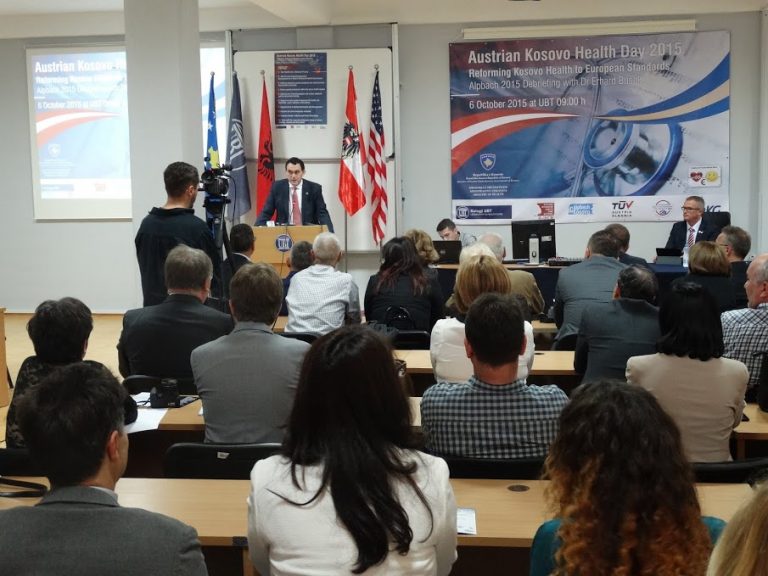
Austria Ready to Continue Helping Kosovo’s Healthcare
06/10/2015Dr. Erhard Busek, former Deputy Chancellor of Austria and well-known European diplomat was extensively involved in the Kosovo issue, actual coordinator of the South East European Cooperation Initiative; Mr. Imet Rrahmani, Minister of Health in the Government of the Republic of Kosovo, and other representatives of the government and different institutions, including professionals of the sector have made their contribution to a conference “Austrian-Kosovo Health Day 2015” organized by the UBT, the Austrian Kosovo Society, and the Austrian Healthcare Network for Kosovo.
The goal of the conference was to discuss the situation in Kosovo’s healthcare sector, the problems the sector is facing, and the ways of improving healthcare services in Kosovo, by using the Austrian experiences as the most positive ones and most developed in Europe.
“Allow me to wish you a warm welcome on behalf of the UBT. As you may be aware, we cooperate with the Austrian organization and we used the Austrian models whenever that is possible — in this case those applied in healthcare, which is a very important topic for Kosovo. We are making efforts to treat this topic in direct and indirect ways intertwined with other issues, like management, technology, and statistics, and by moving closer to the innovative healthcare,” UBT Rector Prof. Dr. Edmond Hajrizi said at the opening of the conference.
Mr. Imet Rrahmani, Minister of Health in the Kosovo Government, said investment in education and healthcare were investments on a safer future. “By making healthcare as one of the main priorities, our government is committed to carrying out substantial and all-inclusive reforms in the healthcare, based on the sector strategy 2015-2020 as well as the European Union’s motto on the healthcare sector “Health Policies in All Policies,” Rrahmani said.
Minister Rrahmani advised that the Health Ministry was at an important phase of implementing reforms in the healthcare system, which would provision of general access to qualitative health services for all citizens of the country and elimination of inequality during the provision of healthcare services.
“This will be achieved by making functional the healthcare system, by increasing efficiency of the health institutions at all levels, improving the space infrastructure and equipment, introducing health insurances, as well as developing management capacities that will lead to an increase in accountability, transparency of managing structures,” he said.
Further, the minister elaborated on a number of aspects related to the establishment of the public fund of health insurances, implementation and complete functioning of the health information system, full functioning of chambers of health professionals, and other issues of interest for the health reforms.
Erhard Busek, Coordinator of the Southeast European Cooperation Initiative (SECI), noted that interventions were required to improve the conditions of health institutions, health preventives, health education, and other areas related to health care. He noted that meetings like the “Austrian-Kosovar Health Day” sets out the frameworks of an academic cooperation with the aim of establishing partnership, exchange of experiences, improvement of quality of the services, health education, and health management.
Mr. Busek spoke also about a number of experiences of Austria. He said his country that had made important efforts and engagement since the World War II and the results came many years later. He said the Kosovars should be proud of what they have achieved and not to create the feeling of the lack of what they do not have.
“You need to continue working to achieve more in the field of education as well, as soon as you can,” Busek said, adding that in this journey, Kosovo would have unrelenting support from Austria.
Dr. Salih Ahmeti, Dean of the Medical Faculty of the Prishtina University, recalled the huge support that Austria had offered to Kosovo in the field of healthcare.
“The Austrian Government’s support for the education system in Kosovo started in 1990s, through a concrete project for the Medical Faculty, with students being able to make visits to Austria, which was of a vital importance for this faculty,” Dr. Ahmeti said.
“Every form of help is welcome and it should not be forgotten especially considering the time it was offered. A special appreciation goes to the Vienna University and the state of Austria that helped us with many things, including laboratory equipment of that time, which was of a paramount importance. Through their office, they supported our students to do doctoral studies in Austria. The experience gained there is special for us,” Dean Ahmeti said.
Representatives of other institutions who spoke at the conference treated different aspects of the development of the healthcare sector of Kosovo. At the conclusion, a substantial debate on the topic was held.